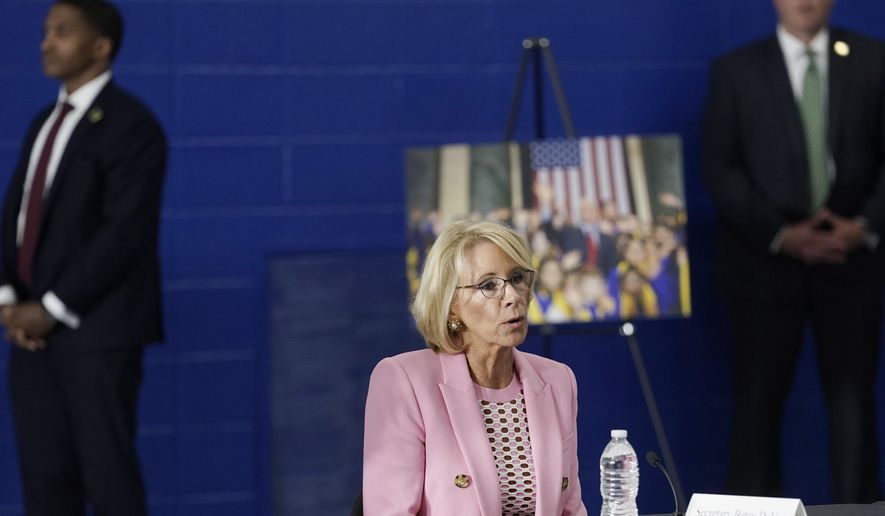Education Secretary Betsy DeVos on Thursday pledged support for private schools under the CARES Act, lamenting the closure of private academies, particularly Catholic institutions, amid the pandemic.
In brief remarks with reporters, Mrs. DeVos also said a new interim rule set to be published will ensure that private schools aren’t shut out when funds from the emergency coronavirus legislation flow to local education agencies.
“There’s nothing in the law that Congress passed that would allow districts to discriminate against children and teachers based on private school attendance and employment,” Mrs. DeVos said in a phone conference.
Some public school advocates have criticized the Education Department for sending too much of the $13 billion emergency funding earmarked for K-12 school districts.
But the secretary said Thursday the coronavirus “doesn’t discriminate” and has negatively impacted private schools, too.
“While a number of traditional public schools aren’t sure whether they will open their doors in the fall, too many other kinds of schools are sure they won’t open at all,” Mrs. DeVos said. “More than 100 private schools, including many Catholic schools, have already announced they will never reopen, and hundreds more face a similar fate.”
According to the libertarian Cato Institute, 74 private schools — including 60 Catholic schools — have closed permanently since the onset of the coronavirus pandemic.
The emergency funds will pay for “equitable services” such as cleaning, equipment to guard the health of teachers and students, teacher training in remote instruction, and distance education tools.
On Thursday’s call, federal officials pushed back against the critique that private schools serve only affluent children.
“If you think that private schools typically are like Sidwell Friends or Georgetown Day, I want to help you understand that about 90% of the private schools in America are small schools that are serving low- and middle-class working families,” said Education Undersecretary James Blew, referring to popular private academies in Washington.
Students who attend private schools have been able to receive taxpayer-funded services under the Elementary and Secondary School Act of 1965 and the 1990 Individuals with Disabilities Education Act.
But liberals in Congress and teachers’ unions have blasted Mrs. DeVos’ posture that CARES Act funds should be evenly distributed to public and private schools, regardless of sectarian affiliation and income.
On Thursday, the National Education Association, nation’s largest teacher’s union, called Mrs. DeVos’ rule change “clear as mud.”
“DeVos is still trying to distribute the funds overall based on total population but is trying to stem the inevitable lawsuit by saying local education agencies can choose to distribute based on Title I, with additional accountability measures for those public school districts,” said NEA President Lily Eskelsen Garcia.
Thursday’s rule appears to allow more latitude for states and local school districts to determine how the funds will be spent. Officials said the Education Department is not backtracking from criticism.
“It’s their [schools’] choice,” Mr. Blew said, criticizing stereotypes of the socioeconomic profile of private school students. “If they only want to serve low-income children, we’re leaving them an option.”
According to the Council for American Private Education, about one-tenth of the nation’s school-age population, or 5.7 million children, attend private schools.
In 2015, nearly 70% of private school children were White, according to the National Center for Education Statistics. Comparatively, compared to just 50% of students attending public schools are White.
Similarly, only 8% of students attending private schools were classified as living in “poor” households, while 19% of public school children were living in poverty, according to the U.S. Census Bureau’s poverty threshold.
• Christopher Vondracek can be reached at cvondracek@washingtontimes.com.




Please read our comment policy before commenting.